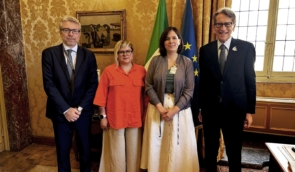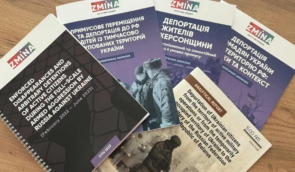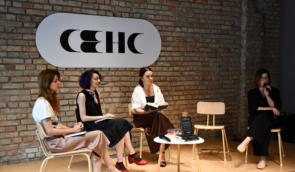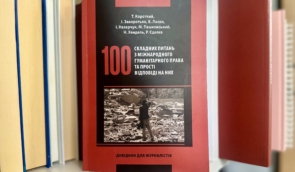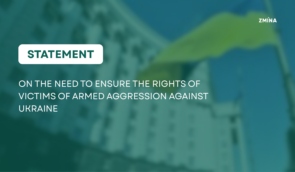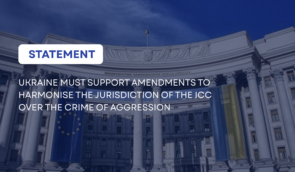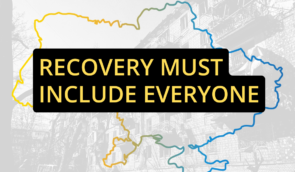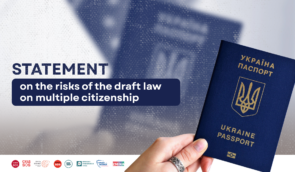Letters to Free Crimea: write warm words to political prisoners of the Kremlin
From February 19 to May 19, 2024, the Letters to Free Crimea initiative will continue in Ukraine and abroad. The campaign encourages Ukrainians and residents of other countries to send letters of support to Crimean political prisoners illegally detained by Russia.

This was announced on February 19, 2024; the day of the start of the campaign, during a press conference in Kyiv by the organisers – the Mission of the President of Ukraine in the Autonomous Republic of Crimea, PEN Ukraine, Human Rights Centre ZMINA and the Ministry of Reintegration of Temporarily Occupied Territories of Ukraine.
The purpose of the initiative Letters to Free Crimea is to remind the society about the Ukrainian prisoners of the Kremlin, and to remind the political prisoners that society is interested in and worried about them. These letters are also a message for prison administrations that every citizen of Ukraine is important and Ukrainian society monitors the conditions of their detention.
According to the Representative Office of the President of Ukraine in the Autonomous Republic of Crimea, as of February 19, 2024, Russia holds 208 Crimean political prisoners, 125 of them are Crimean Tatars.
“During the two years of the full-scale war, the number of political prisoners increased significantly due to Ukrainian citizens abducted by the Russians from the Kherson region and Zaporizhzhia, who were transported to the occupied Crimea after the “basements” (and some to Russia). We also know about more than 670 cases of prosecution of Crimean residents for the so-called “discrediting” of the armed forces of the Russian Federation. The Ukrainian peninsula is actively fighting, and 10 years of living in Russian propaganda did not prevent the Crimeans from doing this”, said Anna Sytnikova, the chief consultant of the Crimea Platform Office of the Mission of the President of Ukraine in the Autonomous Republic of Crimea.
The organisers encourage writing letters to prisoners of the Kremlin, because they are imprisoned for their pro-Ukrainian positions, for active resistance to the Russian occupation and the fight for a free Crimea. Prisoners are often held in inhumane conditions, where they are denied even medical care, as a result of which they die.
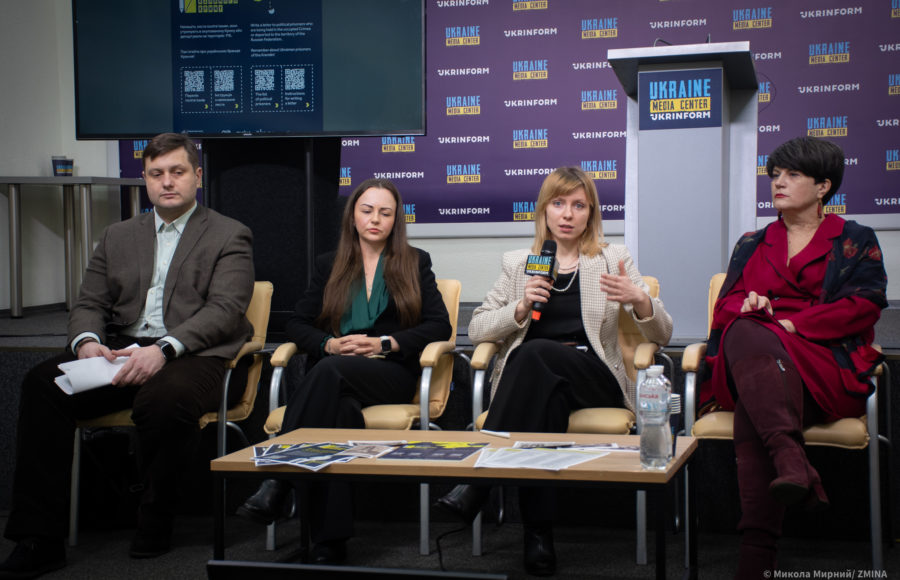 Oleksii Ilnytskyi, Viktoriia Nesterenko, Anna Sytnikova and Larysa Denysenko
Oleksii Ilnytskyi, Viktoriia Nesterenko, Anna Sytnikova and Larysa Denysenko“Writing a letter is probably the easiest thing we can do for political prisoners. However, for them such a gesture of support is particularly meaningful. We all know the conditions political prisoners are in: in places of detention they are tortured and subjected to inhuman treatment in order to break them. Prisoners are held in solitary confinement cells, they are restricted from calling home and seeing their relatives. But if they can even get a letter once in a while, that’s an incredible support. This is how they understand that someone is waiting for them at home, and their resistance was not in vain”, commented Viktoriia Nesterenko, the project manager at Human Rights Centre ZMINA.
Larysa Denysenko, a Ukrainian writer, lawyer, human rights defender, an ambassador of the political prisoner Remzi Bekirov, a member of the Executive Council of PEN Ukraine, noted that letters to prisoners of Kremlin are also support for their relatives:
“Family and loved ones also feel isolated in these conditions. Others who haven’t faced injustice often don’t know what to say, feel helpless. A letter of support is an entry into the common space of conversations, it is an opportunity for even this simple action, rather than remaining in depressing inactivity”.
Oleksii Ilnytskyi, the Deputy Director of the Political Department of the Ministry of Foreign Affairs, noted that this campaign was announced on the eve of the commemoration of three sad dates in the history of Ukraine: the 10th anniversary of the start of Russia’s war against Ukraine, the second anniversary of the full-scale invasion, and The Day of Resistance to the Occupation of Crimea. Ilnytskyi added that the Ministry of Foreign Affairs promotes the release of Ukrainian citizens through diplomatic pressure and advocacy, the introduction of international sanctions, and international solidarity campaigns.
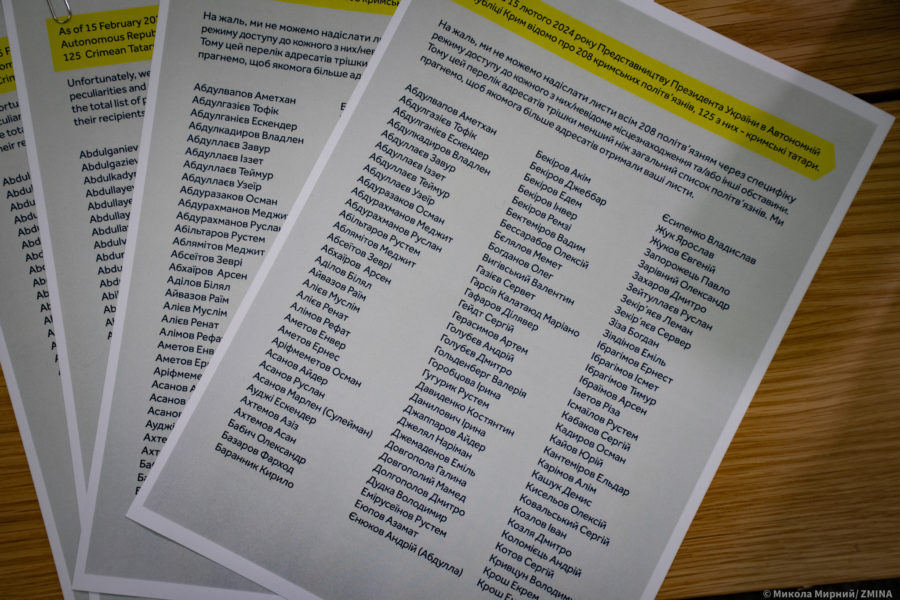
Those interested can send letters to a physical address or online from February 19 to May 19:
Physical address (sending at the sender’s expense): Human Rights Information Center, PO Box В-539, Kyiv, 01001
Email: Free.CrimeaUA@gmail.com
If you plan to send letters from abroad, you can send them directly to the Russian Federation (letters cannot reach the occupied Crimea). Pay attention that your letter must be in Russian, it is also better to make the signature of the receiver and the sender in Russian too (although signatures can be written in the language of the country from which you are sending, but Russian guarantees its more accurate delivery).
Instructions for writing letters can be found here. When writing a letter, please indicate to which of the political prisoners you are addressing it. You can see the list of political prisoners and track their current place of detention on the map by following the link.
If you plan to send letters from abroad, you can send directly to the Russian Federation (letters cannot reach the occupied Crimea). Remember that your letter must be in Russian, it is better to make the signature of the receiver and the sender in Russian, but you can also write in the language of the country from which you are sending. You can also find the address for sending letters on the map above.
Organisers of the initiative: Mission of the President of Ukraine in the Autonomous Republic of Crimea, PEN Ukrainian, Human Rights Centre ZMINA, Ministry of Reintegration of Temporarily Occupied Territories of Ukraine.
You can watch the video from the press conference here.
If you have found a spelling error, please, notify us by selecting that text and pressing Ctrl+Enter.

